高中英语语法省略句
- 格式:docx
- 大小:39.17 KB
- 文档页数:9
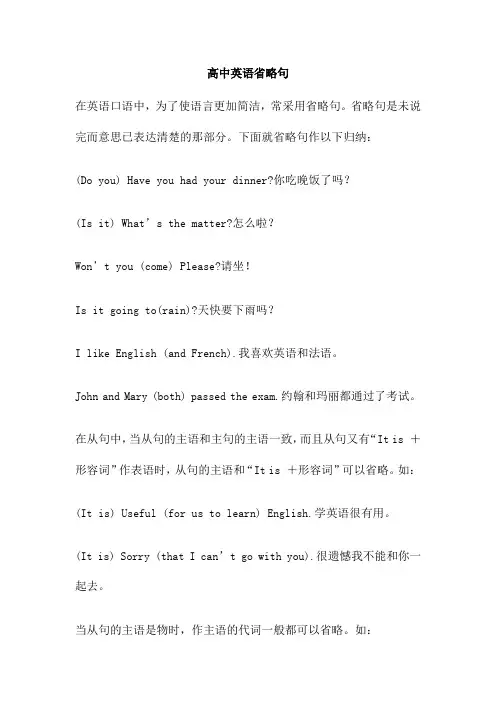
高中英语省略句在英语口语中,为了使语言更加简洁,常采用省略句。
省略句是未说完而意思已表达清楚的那部分。
下面就省略句作以下归纳:(Do you) Have you had your dinner?你吃晚饭了吗?(Is it) What’s the matter?怎么啦?Won’t you (come) Please?请坐!Is it going to(rain)?天快要下雨吗?I like English (and French).我喜欢英语和法语。
John and Mary (both) passed the exam.约翰和玛丽都通过了考试。
在从句中,当从句的主语和主句的主语一致,而且从句又有“It is +形容词”作表语时,从句的主语和“It is +形容词”可以省略。
如:(It is) Useful (for us to learn) English.学英语很有用。
(It is) Sorry (that I can’t go with you).很遗憾我不能和你一起去。
当从句的主语是物时,作主语的代词一般都可以省略。
如:The book (that I read yesterday) is very interesting.我昨天读的那本书很有趣。
在定语从句中,当先行词在定语从句中作状语时,关系代词可以省略。
如:The way (that/which) we use is more convenient.我们使用的方法更简便。
The reason (why) he was late is that he had to help the old lady across the street.他迟到的原因是他得帮助那位老太太过马路。
在一些表示建议、请求、命令等含义的动词后的宾语从句中,谓语动词常省略。
如:I suggest (that) we (should) discuss the matter.我建议我们讨论这个问题。
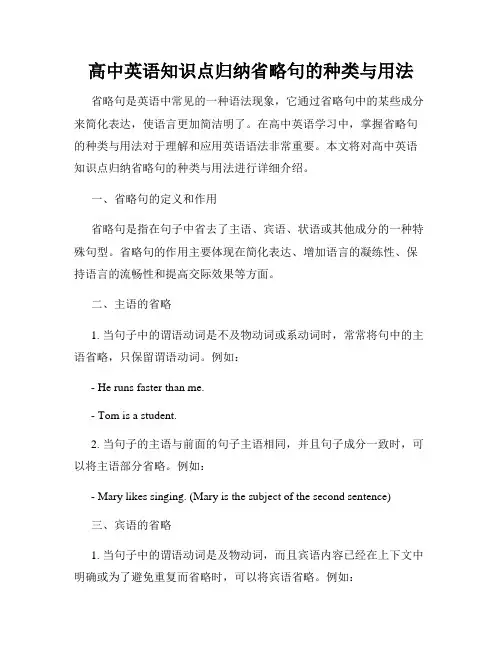
高中英语知识点归纳省略句的种类与用法省略句是英语中常见的一种语法现象,它通过省略句中的某些成分来简化表达,使语言更加简洁明了。
在高中英语学习中,掌握省略句的种类与用法对于理解和应用英语语法非常重要。
本文将对高中英语知识点归纳省略句的种类与用法进行详细介绍。
一、省略句的定义和作用省略句是指在句子中省去了主语、宾语、状语或其他成分的一种特殊句型。
省略句的作用主要体现在简化表达、增加语言的凝练性、保持语言的流畅性和提高交际效果等方面。
二、主语的省略1. 当句子中的谓语动词是不及物动词或系动词时,常常将句中的主语省略,只保留谓语动词。
例如:- He runs faster than me.- Tom is a student.2. 当句子的主语与前面的句子主语相同,并且句子成分一致时,可以将主语部分省略。
例如:- Mary likes singing. (Mary is the subject of the second sentence)三、宾语的省略1. 当句子中的谓语动词是及物动词,而且宾语内容已经在上下文中明确或为了避免重复而省略时,可以将宾语省略。
例如:- Can you speak French? Yes, I can. (French is the object of speak)四、状语的省略1. 当句子中的状语从句与主句的主语或宾语一致时,可以将状语从句中的主语或宾语省略。
例如:- He speaks English better than I (do). (I is the subject of do)- She likes swimming more than her sister (does). (Her sister is the subject of does)2. 当句子中的状语从句与主句的谓语动词一致时,可以将状语从句中的谓语动词省略。
例如:- I work harder than you (do). (Do is the verb of the subordinate clause)五、被动语态的省略1. 当句子中的被动语态中的被动助动词和be动词前面有介词时,可以将be动词和介词省略。
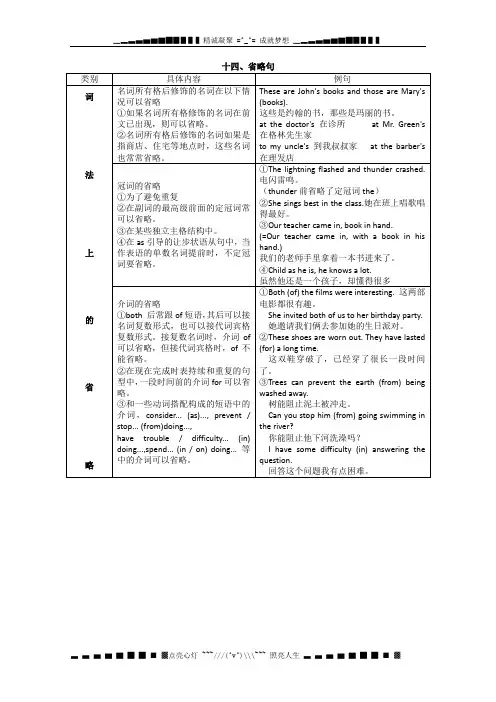
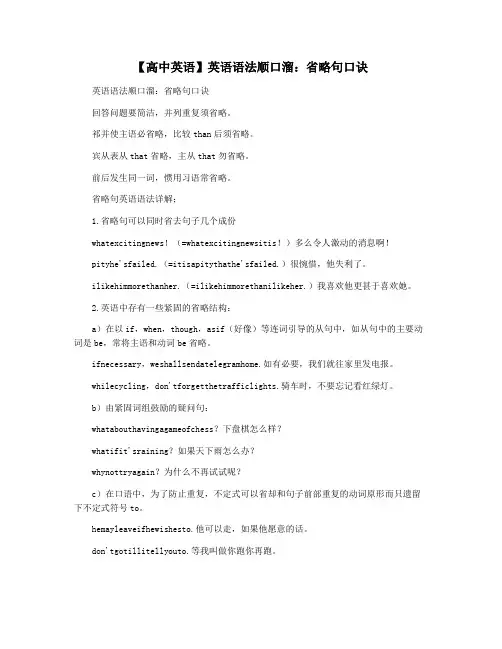
【高中英语】英语语法顺口溜:省略句口诀英语语法顺口溜:省略句口诀回答问题要简洁,并列重复须省略。
祁并使主语必省略,比较than后须省略。
宾从表从that省略,主从that勿省略。
前后发生同一词,惯用习语常省略。
省略句英语语法详解;1.省略句可以同时省去句子几个成份whatexcitingnews!(=whatexcitingnewsitis!)多么令人激动的消息啊!pityhe'sfailed.(=itisapitythathe'sfailed.)很惋惜,他失利了。
ilikehimmorethanher.(=ilikehimmorethanilikeher.)我喜欢他更甚于喜欢她。
2.英语中存有一些紧固的省略结构:a)在以if,when,though,asif(好像)等连词引导的从句中,如从句中的主要动词是be,常将主语和动词be省略。
ifnecessary,weshallsendatelegramhome.如有必要,我们就往家里发电报。
whilecycling,don'tforgetthetrafficlights.骑车时,不要忘记看红绿灯。
b)由紧固词组鼓励的疑问句:whatabouthavingagameofchess?下盘棋怎么样?whatifit'sraining?如果天下雨怎么办?whynottryagain?为什么不再试试呢?c)在口语中,为了防止重复,不定式可以省却和句子前部重复的动词原形而只遗留下不定式符号to。
hemayleaveifhewishesto.他可以走,如果他愿意的话。
don'tgotillitellyouto.等我叫做你跑你再跑。
3.被省略的部分一般可以在句子中补上,但有时省略结构已经定型,如果把省略部分补上,反而不合乎习惯。
heistallerthaniam.他比我低。
(am之后省略tall,迁调上相左习惯)noparking.禁止停车。
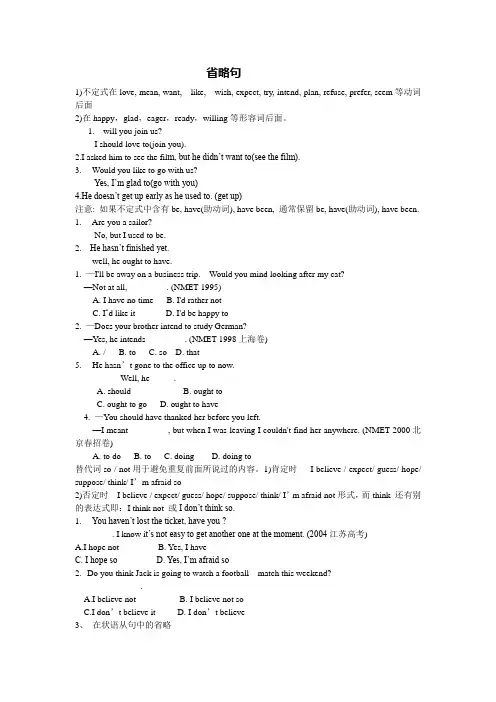
省略句1)不定式在love, mean, want, like, wish, expect, try, intend, plan, refuse, prefer, seem等动词后面2)在happy,glad,eager,ready,willing等形容词后面。
1.---will you join us?--- I should love to(join you).2.I asked him to see the fil m, but he didn’t want to(see the film).3.--- Would you like to go with us?--- Yes, I’m glad to(go with you)4.He doesn’t get up early as he used to. (get up)注意: 如果不定式中含有be, have(助动词), have been, 通常保留be, have(助动词), have been.1.--- Are you a sailor?--- No, but I used to be.2.---He hasn’t finished yet.---well, he ought to have.1. —I'll be away on a business trip. Would you mind looking after my cat?—Not at all, ________ . (NMET 1995)A. I have no timeB. I'd rather notC. I‘d like itD. I'd be happy to2. —Does your brother intend to study German?—Yes, he intends ________ . (NMET 1998上海卷)A. /B. toC. soD. that5.--- He hasn’t gone to the office up to now.--- Well, he _____.A. shouldB. ought toC. ought to goD. ought to have4. —You should have thanked her before you left.—I meant ________ , but when I was leaving I couldn't find her anywhere. (NMET 2000北京春招卷)A. to doB. toC. doingD. doing to替代词so / not用于避免重复前面所说过的内容。
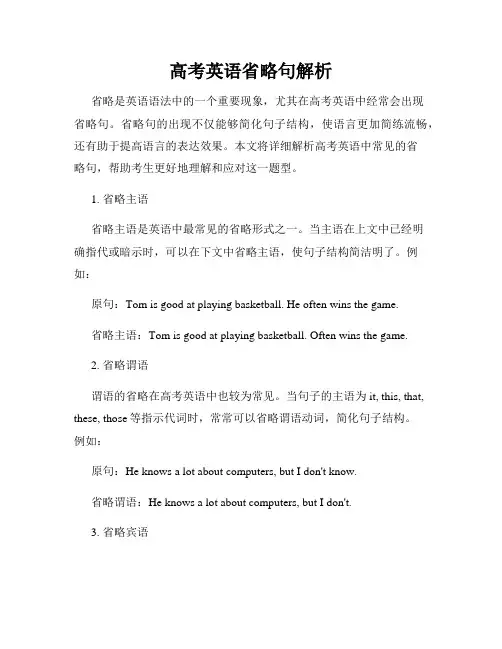
高考英语省略句解析省略是英语语法中的一个重要现象,尤其在高考英语中经常会出现省略句。
省略句的出现不仅能够简化句子结构,使语言更加简练流畅,还有助于提高语言的表达效果。
本文将详细解析高考英语中常见的省略句,帮助考生更好地理解和应对这一题型。
1. 省略主语省略主语是英语中最常见的省略形式之一。
当主语在上文中已经明确指代或暗示时,可以在下文中省略主语,使句子结构简洁明了。
例如:原句:Tom is good at playing basketball. He often wins the game.省略主语:Tom is good at playing basketball. Often wins the game.2. 省略谓语谓语的省略在高考英语中也较为常见。
当句子的主语为it, this, that, these, those等指示代词时,常常可以省略谓语动词,简化句子结构。
例如:原句:He knows a lot about computers, but I don't know.省略谓语:He knows a lot about computers, but I don't.3. 省略宾语宾语的省略是一种语言表达的简化方式。
当句子中的宾语是人称代词时,常常可以省略宾语,使句子更加简洁。
例如:原句:I saw him yesterday, but he didn't see me.省略宾语:I saw him yesterday, but he didn't see.4. 省略定语从句定语从句的省略在高考英语中也颇为常见。
当定语从句的主语和谓语与主句中的一致时,可以将定语从句中的主语和谓语省略,只保留从句中的关系词和其他修饰成分。
例如:原句:The book that I borrowed from the library yesterday is very interesting.省略定语从句:The book I borrowed from the library yesterday is very interesting.5. 省略介词短语在高考英语中,介词短语的省略也是一种常见现象。
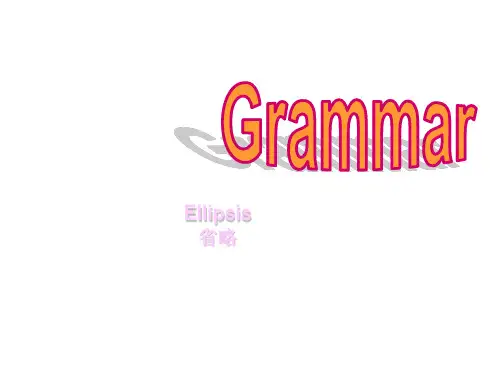

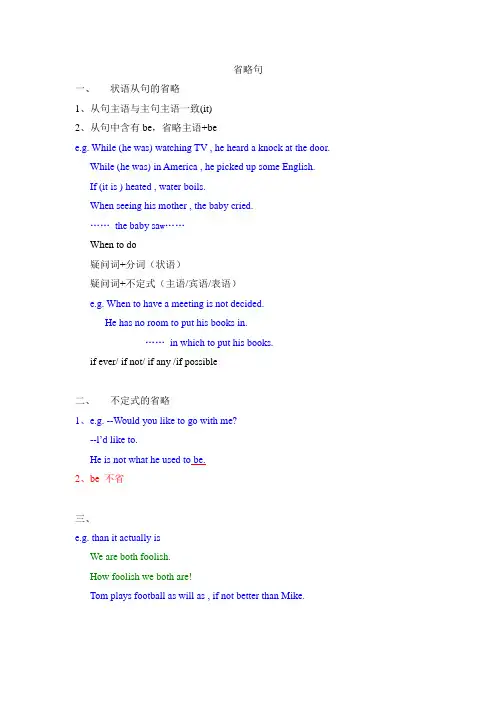
省略句一、状语从句的省略1、从句主语与主句主语一致(it)2、从句中含有be,省略主语+bee.g. While (he was) watching TV , he heard a knock at the door.While (he was) in America , he picked up some English.If (it is ) heated , water boils.When seeing his mother , the baby cried.……the baby sa w……When to do疑问词+分词(状语)疑问词+不定式(主语/宾语/表语)e.g. When to have a meeting is not decided.He has no room to put his books in.……in which to put his books.if ever/ if not/ if any /if possible二、不定式的省略1、e.g. --Would you like to go with me?--l’d like to.He is not what he used to be.2、be 不省三、e.g. than it actually isWe are both foolish.How foolish we both are!Tom plays football as will as , if not better than Mike.四、I think so/l don’t think so.I hope so/l hope notI’m afraid so/l’m afraid not。
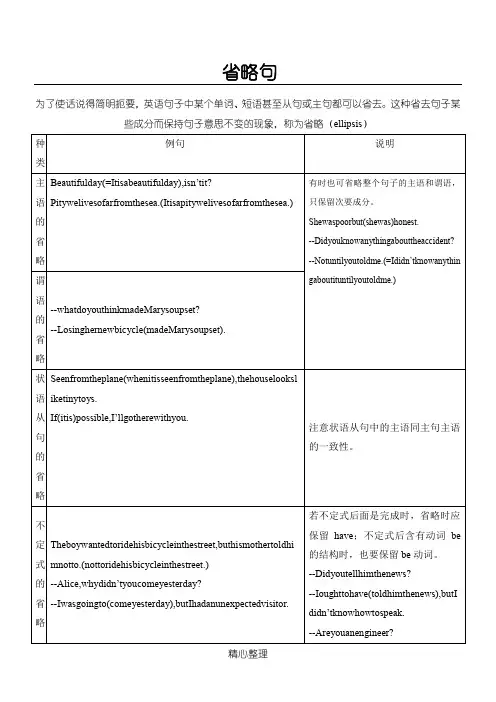
省略句为了使话说得简明扼要,英语句子中某个单词、短语甚至从句或主句都可以省去。
这种省去句子某些成分而保持句子意思不变的现象,称为省略(ellipsis)Ⅰ、状语从句中的省略用法一、如果从句的主语和主句的主语一致,且从句的谓语含有be动词的某种形式(am/is/are/was/were),可同时省略从句的主语和be动词的某种形式。
1、when,while引导的时间状语从句e.g.Dobecarefulwhen(youare)crossingthestreet.When/While(Iwas)onmywaytowork,Imether.2、3、4、二、三、以if从句为代表的状语从句中的特殊省略用法:通常省略了itis,thatis,thereis/are。
e.g.If(itis)possible/necessary,thisoldtemplewillberebuilt.If(thatis)so,Iwillcallyoubackat5:00pm.Thereareonlyafewbooksinourschoollibrary,if(thereare)any.Ⅱ、定语从句中的省略用法关系词的省略关系代词that,which,whom等在限制性定语从句中充当宾语且不位于介词之后时,可以省略;inwhich或that在先行词way后作方式状语从句时可省略。
e.g.Theman(that/who/whom)youvisitedlastnightismygrandpa.Idon’tliketheway(inwhich/that)youtreatthegirl.Ⅲ、虚拟语气中if及should的省略1、当条件状语从句中有were,had,should等时省略if,把它们提至句首,形成倒装句。
e.g.IfIwereateacher,Iwouldbestrictwithmystudents.=WereIateacher,Iwouldbestrictwithmystudents.2、1、2、E.g3、,love,hate。
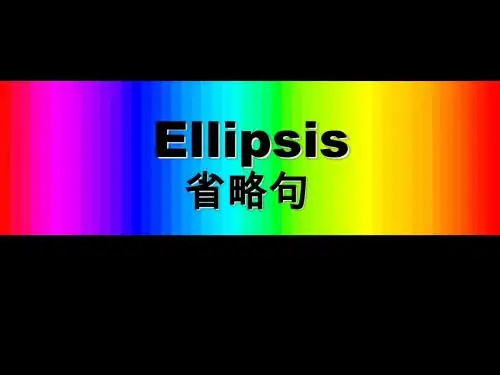
省略句的常见形式与解析在英语语法中,省略句是指在句子中省略掉某些成分,但仍能通过上下文来理解其完整的意思。
省略句的使用可以简化句子结构,增加语言的流畅性和简洁性。
本文将介绍省略句的常见形式以及相应的解析方法。
一、主语省略句在一些情况下,句子的主语可以被省略。
通常情况下,主语可以通过上下文中的其他信息来推断出来。
例1:(完整句) Tom is playing basketball.(省略句) Playing basketball.解析:由于上文提到Tom正在打篮球,所以在这个省略句中可以省略掉主语,仅保留动词"playing"来表达完整的意思。
例2:(完整句) She sings beautifully.(省略句) Sings beautifully.解析:由于上文提到的人称代词"She"已经明确了主语,所以在这个省略句中可以省略掉具体的主语。
二、谓语省略句在一些情况下,句子的谓语可以被省略。
这种省略形式多见于短语或句型中,通过上下文就可以理解其意思。
例1:(完整句) He can play the guitar, but I can't.(省略句) He can play the guitar, but I can't play (the guitar).解析:在这个省略句中,通过上文提到的主题"play the guitar",可以省略掉谓语"Not",而保留上文中的句意。
例2:(完整句) John lives in New York, and Mary in Los Angeles.(省略句) John lives in New York, and Mary in Los Angeles.解析:在这个省略句中,由于谓语"lives"已经在上文中出现过,因此可以省略掉后面的谓语,仅根据上下文理解出Mary的具体情况。
完整版)高中英语语法省略句Ellipsis is XXX omitting certain words。
phrases。
or XXX in order to make the XXX.One type of ellipsis is the n of the subject and predicate of a sentence。
XXX.For example。
"Beautiful day。
isn't it?" instead of "It is a beautiful day。
isn't it?"Another type is the n of the predicate。
XXX.For example。
"Pity we live so far from the sea" instead of "It is a pity we live so far from the sea."XXX。
XXX.For example。
"Seen from the plane。
the house looks XXX."When the infinitive is followed by the perfect tense。
the infinitive XXX.For example。
"The boy wanted to ride his bicycle in the street。
but his mother told him not to."In cases where the infinitive is followed by the verb "be," the verb "be" should be retained.For example。
英语中的省略句是一种特殊的句型,通过省略部分句子成分,使句子更加简洁、流畅。
省略句的使用可以提高句子表达的效果,但也需要注意一些规则。
在英语中,常见的省略句有主语、谓语、宾语和其他成分的省略。
以下是一些常见的省略句规则:1.主语的省略当主语已经在上下文中明确指出时,可以省略主语。
例如:•Who is the winner? (Who: 主语)•Tom is. (Tom: 主语)2.谓语的省略当句子中的谓语动词与上文中的主谓一致时,可以省略谓语动词。
例如:•Have you finished your homework? (Have you: 谓语动词)•Yes, I have. (I have: 谓语动词)3.宾语的省略当宾语是不定式短语、动名词短语或从句时,有时可以省略宾语。
例如:•I want to eat some ice cream. (to eat some ice cream: 宾语)•I want to. (to: 宾语)•She enjoys swimming in the summer. (swimming in the summer: 宾语)•She enjoys it. (it: 宾语)4.其他成分的省略有些介词短语或副词短语在语境中已经明确,可以省略。
例如:•Peter is going to the supermarket. (to the supermarket: 介词短语)•So is Mary. (So: 其他成分)•He said he would visit us tomorrow. (tomorrow: 副词短语)•He said he would. (He: 其他成分)正如以上所述,省略句是一种简化语句结构的技巧,使句子更加简洁。
然而,省略句也有一些注意事项。
首先,省略句要根据上下文进行判断。
如果没有足够的上下文信息,可能会造成误解。
其次,省略句需要遵守语法规则。
高中英语语法省略句Ellipsis is a phenomenon in English sentences where a word。
phrase。
or even a clause or main clause can be omitted in order to make the sentence more concise while maintaining its meaning.There are different types of ellipsis。
such as the n of the subject or predicate。
where only the minor elements are kept.For example。
"Beautiful day" can be shortened to just "day" and still convey the same meaning。
Another example is "Pity we live so far from the sea," which can be shortened to "It is a pity we live so far from the sea."Predicate ellipsis can be seen in the sentence "Losing her new bicycle made Mary so upset." Here。
the predicate "made Mary so upset" is used without repeating the subject "losing her new bicycle."Adverbial clauses can also be shortened。
such as "Seen from the plane。
the house looks like tiny toys." Here。
the adverbial clause "when it is seen from the plane" is omitted.When using an infinitive。
such as in "The boy wanted to ride his bicycle in the street。
but his mother told him not to," the infinitive "not to ride his bicycle in the street" is used instead of repeating the subject.Finally。
in cases where the infinitive is followed by the perfect tense。
such as "I was going to come yesterday。
but I had an unexpected visitor," the auxiliary verb "have" should be retained。
Similarly。
when the infinitive is followed by the verb "be," the verb "be" should also be retained.可省略从句中的主语和be动词的某种形式。
e.g。
She is taller than (he is).He can run faster than (I can).Ⅰ、省略主语和be动词的用法在状语从句中,如果从句的主语和主句的主语一致,且从句的谓语含有be动词的某种形式,那么可以同时省略从句的主语和be动词的某种形式。
比如,当when或while引导的时间状语从句中,我们可以省略从句中的主语和be动词的某种形式,例如:“Do be careful when (you are) crossing the street.” 当然,如果从句的主语和主句的主语不一致,我们只能省略从句中的be动词形式。
比如,“He was happy。
though/although (he was) poor.”在比较状语从句中,如果不同的主语进行比较,也可以省略从句中的主语和be动词的某种形式。
例如,“She is taller than (he is).”General rules for ellipsis in clauses include omitting the predicate in subordinate clauses and omitting the subject and predicate in the subordinate clause if they match those in the main clause。
For example。
"He is taller than his brother (is)."In adverbial clauses。
such as those starting with "if," ellipsis may include omitting "it is," "that is," or "there is/are." For instance。
"If possible/necessary。
this old temple will be rebuilt."In relative clauses。
the relative pronoun "that," "which," or "whom" can be omitted when it acts as the object and does notcome after a n。
"The man you visited last night is my grandpa." "In which" or "that" can also be omitted after "way" when it is used as a manner adverbial clause。
"I don't like the way you treat the girl."In the subjunctive mood。
"if" and "should" can be omitted。
In nal clauses with "were," "had," or "should," "if" can be omitted and inverted to form an inverted sentence。
"Were I a teacher。
I would be strict with my students." In clauses with verbs like "suggest," "insist," "order," or "require," the verb can be followed by a clause with "should" + verb。
which can be omitted。
"The doctor suggested he try to lose weight."Finally。
the infinitive marker "to" can also be omitted in certain cases.Sure。
what do you need?2、I saw him running towards the n。
but I didn't have time to talk to him.3、She can't help but feel nervous before a big exam.4、I want to learn how to play the guitar。
but I don't have the time.5、I suppose he won't be able to make it to the party.6、Three copies。
please.7、No。
I've never been to the Great Wall.1."I'm running a little late," I said apologetically。
hoping that my delay wouldn't be too long。
2."Where to。
sir?" the taxi driver asked politely as I hailed him down。
3.The doctor strongly mends that the patient undergoes an n immediately。
4.When he returned。
he noticed that the bag he had left hanging over the seat was missing。
5.Liu Xiang spoke slowly to the Special Olympic competitors in order for them to understand him。
6."There may be only a few English story books for studentsin the library。
if any," the librarian replied。